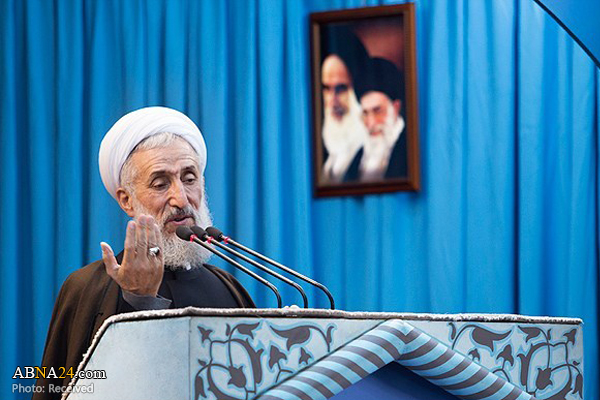(AhlulBayt News Agency) - Tehran's provisional Friday Prayers Leader Hojjatoleslam Kazzem Seddiqi blasted certain Arab leaders for their indifference and silence on the ongoing massacre of the Palestinians by the Israeli regime in the Gaza Strip.
Addressing a large and fervent congregation of the people in Tehran on Friday, Hojjatoleslam Seddiqi said, "The Arab leaders have kept mum on the Palestinian cause because the US has much dominance over them."
The senior cleric reiterated that the US' silence comes as many world countries have condemned Israel's crimes in Gaza Strip.
"As the Supreme Leader (of the Islamic Revolution Ayatollah Seyed Ali Khamenei) has reiterated the collapse of the Zionist regime will happen in 25 years time," Hojjatoleslam Seddiqi added.
The United States officially opened its embassy to Israel in the Holy Qods on Monday despite warnings from around the world that the measure risks triggering a fresh wave of violence in the Middle East.
At least 63 Palestinians were martyred and over 2,700 others wounded when the Zionist forces attacked a peaceful rally of the Palestinians in Gaza Strip on Monday.
Tens of thousands of Palestinians launched the Great March of Return in the besieged Gaza Strip on Monday to demand their right of return to their villages and towns they were forcibly displaced.
"These are the biggest protests we have seen on the border with Gaza so far," Israeli Defense Forces Spokesman told Kann News.
The rally also coincided with the moving of the US Embassy from Tel Aviv to Jerusalem, in line with the Washington's recognition of Jerusalem as the capital of Israel in December, furthering stoking tensions and angering Palestinians.
The 46-day peaceful protests began on March 30, which coincided with the 42nd anniversary of the Land Day, which marks the day Israeli forces killed six Palestinians during protests against land confiscation in 1976. It continues until May 15, which marks the 70th anniversary of the Nakba (catastrophe), in which over 750,000 Palestinians were forcibly displaced from their homes in 1948.
The United Nations top human rights official has strongly condemned Israel’s use of “excessive force” on Palestinian protesters in the Gaza Strip. UN High Commissioner for Human Rights Zeid Ra'ad al-Hussein has stressed that Israel had to stop the practice and hold to account those responsible for the many deaths and injuries.
Palestinian and foreign doctors have reported that the live fire used by Israeli troops has caused unusually severe injuries among protesters in the besieged Gaza Strip over the past month.
Multiple human rights organizations have come out in full condemnation of Israel’s violent raid on the massive unarmed civilian protests in the besieged sliver.
Human Rights Watch (HRW) slammed Israel’s killing of Palestinian protesters as “unlawful” and “calculated”, saying those officials who authorized the Israeli military to use lethal force ahead of the mass rallies in Gaza are to blame for the bloodshed.
The HRW added that footage of the Gaza demonstrations includes no evidence of protesters using firearms, questioning the Israeli claim that the number of Palestinians injured by live ammunition was likely in the dozens.
/257
source : FNA
Friday
18 May 2018
1:14:17 PM
893944
Tehran's Friday Prayers;
Senior Cleric blasts Arab Leaders for their silence on Israel's massacre of Palestinians

Tehran's provisional Friday Prayers Leader Hojjatoleslam Kazzem Seddiqi blasted certain Arab leaders for their indifference and silence on the ongoing massacre of the Palestinians by the Israeli regime in the Gaza Strip.
